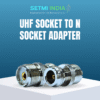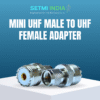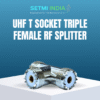Premium UHF Socket to N Socket Adapter – PL-259 to N Female | UHF Female to N-Type Connector for RF & Radio Applications
The UHF Socket to N Socket Adapter – PL-259 to N Female | UHF Female to N-Type Connector is a high-performance PL-259 UHF Male Connector designed for reliable RF signal transmission. Whether you are a Ham Radio operator, a broadcast engineer, or installing CCTV systems, this connector ensures minimal signal loss and a secure connection.
Built with precision-engineered materials, the UHF Socket to N Socket Adapter – PL-259 to N Female | UHF Female to N-Type Connector offers excellent durability and corrosion resistance. It differs from standard connectors by providing a more robust mechanical connection, essential for environments prone to vibration or frequent handling.
Key Features:
- Superior Conductivity: Features high-grade contacts for efficient signal transfer.
- Durable Construction: Nickel-plated body provides long-lasting protection against oxidation and wear.
- Secure Fit: Threaded coupling mechanism ensures a tight, vibration-resistant connection.
- Versatile Use: Compatible with a wide range of Universal Coaxial coaxial cables and RF equipment.
- Easy Installation: Designed for straightforward soldering or crimping (depending on model).
Technical Specifications:
- Product: UHF Socket to N Socket Adapter – PL-259 to N Female | UHF Female to N-Type Connector
- Connector Type: UHF Connectors
- Gender: Male to Female
- Frequency Range: DC – 300 MHz (Typical for UHF)
- Insulation: PTFE (Teflon) / Bakelite
- Temperature Range: -50°C to +85°C
Applications:
This UHF Connectors is ideal for:
- Amateur (Ham) Radio Equipment
- CB Radios & Antennas
- Marine Communication Systems
- Public Address (PA) Systems
- CCTV & Video Surveillance
- RF Test Equipment
Why Buy from Setmi India?
At Setmi India, we deliver professional-grade RF connectors tested for quality and performance. Enjoy competitive pricing, fast shipping across India, and dedicated customer support for all your connectivity needs.
Upgrade your setup with the UHF Socket to N Socket Adapter – PL-259 to N Female | UHF Female to N-Type Connector today!





 24 x 7 Customer Support
24 x 7 Customer Support  Fast Delivery
Fast Delivery  High Quality Products
High Quality Products 
Reviews
There are no reviews yet.